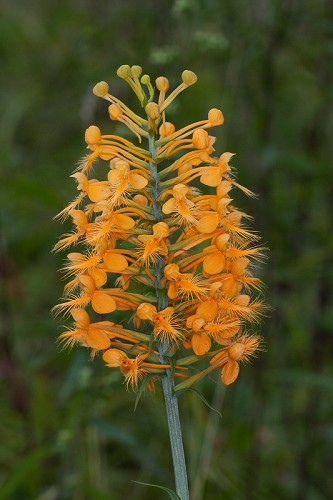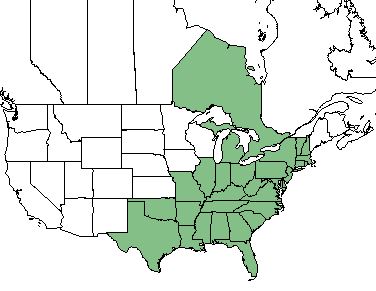Difference between revisions of "Platanthera ciliaris"
(→Conservation and Management) |
(→Ecology) |
||
| Line 30: | Line 30: | ||
==Ecology== | ==Ecology== | ||
| − | ===Habitat=== <!--Natural communities, human disturbed habitats, topography, hydrology, soils, light, fire regime requirements for removal of competition, etc.--> | + | ===Habitat=== |
| + | Native habitat for ''P. ciliaris'' includes bogs, swamps, marshes, wet sandy barrens, thickets that border streams and ponds, moist woods, wet meadows, praires, and deep humus of upland forests. <ref name= "USDA"> [https://plants.usda.gov/core/profile?symbol=CEAM USDA Plant Database]</ref> | ||
| + | |||
| + | Shaded areas or partial sun is ideal for this orchid. Also, slightly acidic soils are ideal. <ref name= "USDA"> [https://plants.usda.gov/core/profile?symbol=CEAM USDA Plant Database]</ref> | ||
| + | <!--Natural communities, human disturbed habitats, topography, hydrology, soils, light, fire regime requirements for removal of competition, etc.--> | ||
===Phenology=== | ===Phenology=== | ||
Flowers are known to bloom between July and September. <ref name= "Pan Flora"> [http://www.gilnelson.com/PanFlora/ Pan Flora]</ref> | Flowers are known to bloom between July and September. <ref name= "Pan Flora"> [http://www.gilnelson.com/PanFlora/ Pan Flora]</ref> | ||
| Line 38: | Line 42: | ||
<!--===Pollination===--> | <!--===Pollination===--> | ||
<!--===Use by animals===--> <!--Herbivory, granivory, insect hosting, etc.--> | <!--===Use by animals===--> <!--Herbivory, granivory, insect hosting, etc.--> | ||
| − | + | ===Diseases and parasites=== | |
| + | Slugs, snails, and cutworms are known to be pests for the ''P. ciliaris''.<ref name= "USDA"> [https://plants.usda.gov/core/profile?symbol=CEAM USDA Plant Database]</ref> | ||
==Conservation and Management== | ==Conservation and Management== | ||
Revision as of 19:25, 24 May 2018
| Platanthera ciliaris | |
|---|---|

| |
| Photo by John Gwaltney hosted at Southeastern Flora.com | |
| Scientific classification | |
| Kingdom: | Plantae |
| Division: | Magnoliophyta - Flowering plants |
| Class: | Magnoliopsida - Dicots |
| Order: | Orchidales |
| Family: | Orchidaceae |
| Genus: | Platanthera |
| Species: | P. ciliaris |
| Binomial name | |
| Platanthera ciliaris (L.) Lindley | |

| |
| Natural range of Platanthera ciliaris from USDA NRCS Plants Database. | |
Contents
Taxonomic Notes
Synonyms: Habenaria ciliaris (Linnaeus), Blephariglottis ciliaris (Linneaus)
Variety: none
Description
P. ciliaris is a perennial forb/herb of the Orchidaceae family that is native to North America. [1]
Distribution
P. ciliaris is native to the eastern United States, reaching as far west as Texas, as well as Ontario, Canada. [1]
Ecology
Habitat
Native habitat for P. ciliaris includes bogs, swamps, marshes, wet sandy barrens, thickets that border streams and ponds, moist woods, wet meadows, praires, and deep humus of upland forests. [1]
Shaded areas or partial sun is ideal for this orchid. Also, slightly acidic soils are ideal. [1]
Phenology
Flowers are known to bloom between July and September. [2]
Diseases and parasites
Slugs, snails, and cutworms are known to be pests for the P. ciliaris.[1]
Conservation and Management
Due to habitat loss, harvesting, and land management practices such as fire suppression, there has been a decrease in P. ciliaris. It has been listed as threatened in Connecticut, Florida, Maryland, Michigan, Ohio, and Pennsylvania. It is also listed as endangered in Illinois, Indiana, new York, and Rhode Island. Canada is considered to be locally extinct. [1]